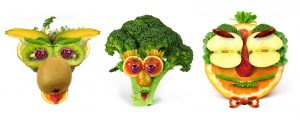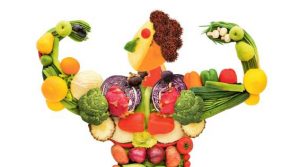Nutrition

Carbohydrates are the main sugars which provide the body energy during difficult workouts. Swimmers are typically lean creatures and capable of handling carbohydrates. Moreover, the body’s ability to handle carbohydrates dramatically increases after workout.
Consume carbohydrates during and after exercise. However, the ability to handle carbohydrates continues for a few hours after working out. A few hours after workout eat a well-balanced diet of 30g protein, 40g carbs, 30g fat. This provides a balanced diet, make sure you obtain sufficient good fats.
For the rest of the day, you would just eat protein, fruits and vegetables, and good fats. Unfortunately, this diet restricts the typical simple carbohydrates over consumed by swimmers, except for the short window around workouts.
Nutrition and sports is necessary, but the overall goal is to improve health and sport. This alteration in nutritional intake helps do essentially four things: (1) improve athletic performance; (2) improve health; (3) improve body composition, and (4) develop lasting habits.
Other nutritional programs may impair health and recovery. The best nutrition program is one which covers all four of the aforementioned items, for the short-term sports improvement, and long-term life enhancement.
Breakfast
Before training, a breakfast bar, fruit and wholemeal toast. After training 1 large bowl cereal + low fat milk; 2 pieces toast with baked beans or eggs + piece fruit and large glass of juice.
Lunch
Now lunch is a different story, as many consume lunch in a cafeteria or restaurant, which provide meals unfit for high performance athletes. However, lunch should not vary much from dinner. Try to find a high-protein foods with a ton of vegetables and whole grain rice and fruit. A low protein, meat sandwich on white bread doesn’t do a body good!
Dinner
Most dinners are typically complete with protein and vegatables (which are unfortunately absent the rest of the day). However, many deals are incomplete as they lack whole grains, fiber, healthy fats, and healthy desserts!
A well-rounded diet should include
- Whole grain: bread, pasta, wild rice, oats, quinoa, etc.
- High fiber legumes (beans and lentils)
- Lean protein: chicken, fish, grass-fed beef, turkey, tofu
- Tons of veggies
- Good fats: avocado, olive oil, coconut oil
- Healthy dessert: fruit, smoothie
Snacks
Most snacks include high sugar and processed carbohydrates. This combination impairs energy levels and recovery for workout. Instead, try consuming a better snack like a shake consisting of fruits, veggies, protein powder, and healthy fats.
Another option is Greek yogurt or cottage cheese with frozen fruit, mixed nuts, and protein powder.
Fluid Needs
A swimmer’s training and competition environment in the pool and on the deck is often warm and humid, and can increase fluid loss from the body. At least 2-3 Litres of water should be consumed regularly during competition and pool training, as dehydration can be detrimental to a swimmer’s performance as it affects concentration and skill level. Moreover, sweat losses are more difficult to determine as they are already wet from the pool. Swimmers can assess how much fluid they lose during a training session by weighing themselves pre and post training. For every 1 kilogram lost: 1.5 litres of fluid needs to be replaced.
Sports drinks are suitable fluids during long training sessions (more than 60 minutes) or if training for maximum performance and are ideal during competition as they provide electrolytes and carbohydrate along with the fluid in between swims. They can also help to achieve high fuel goals, especially in the case of adolescent male swimmers’ growth and training needs.
What should I eat pre-event?
Swimmers should have a high-carbohydrate meal 2 to 4 hours prior to competition, and include a drink of water or sports drink. To avoid stomach discomfort, foods low in fibre and fat can be preferred. Ensure that the meal is well planned and includes familiar foods and fluids. Examples include:
- Breakfast cereal + low fat milk
- Pancakes with syrup + glass juice
- Fruit salad + low fat yoghurt
- English muffin or crumpet with jam/honey Sandwich/roll + salad + lean meat/cheese
- If nervous pre-event and appetite is a problem, carbohydrate-rich fluids can be an alternative, such as a low fat milk or smoothie or liquid meal replacement.
- A small snack such as a muesli bar, fruit or dried fruit can be eaten about an hour prior to the race as a final effort to top up energy levels.
What should I eat during competition?
Swimmers need to ensure they eat enough food and take advantage of opportunities to eat and drink during events. Swimmers should develop an eating plan that fits in with their competition schedule and that includes foods that are familiar with them that will not affect their performance.
Practising competition eating during training sessions will help to identify food choices that will suit them best. Examples below:
- If less than 30 minutes between races: fluids, sports drinks, juices, glucose lollies and fruit are the best options (as they are rapidly digested from the gut)
- If 30-60 minutes between races: sandwiches with honey/jam/banana, sports bars, cereal bars or low fat muesli bars are good choices
- If 1-2 hours between races: pasta, rice or noodle-based dishes with low fat sauce/toppings or sandwiches or rolls are good choices
- If more than 2 hours between races: a more substantial meal or meal replacement can be eaten (with plenty of fluids, of course!)
Whether it is on the way to training or in between heats, swimmers need to go to swimming venues with snacks prepared – do not rely on the venues to provide appropriate food to fuel swimmers!! An esky packed with drinks and cool snacks/sandwiches can be a handy way of keeping food cool and safe by the pool.
What about recovery?
It is very important to refuel with carbohydrate-rich foods during recovery in order to begin replenishing muscle glycogen stores for training/competition. This is especially important during a competition that is held over a few days or during weeks of heavy training. It is also important to include a lean protein source in recovery for muscle tissue repair and growth.
Aim to consume a recovery snack immediately within 30 minutes of finishing a training session or competition. This snack should contain carbohydrates, protein and a source of fluid, e.g. a salad sandwich with a bottle of sports drink, or a bowl of cereal with fruit and milk. Other suitable snacks include cereal/muesli bars, fruit and fruit bars and sports drinks. A substantial meal should follow within 2-4 hours of finishing.
Other Nutrition Tips
Iron levels: Some swimmers may have problems with low iron levels, especially females with low iron intakes. Iron levels should be checked regularly during heavy training or if fatigue levels are unusual. See our fact sheet on Iron Deficiency in Athletes and speak to a Sports Dietitian on how to increase iron in your diet.
- Energy requirements when tapering training before a competition are usually less than during training so match your eating to your training to avoid weight gain.
- Although supplements may be tempting to some swimmers, it is important to speak to sports dietitian first before taking anything to ensure that it is safe to take!

